|
When was it held: March 31, 2006
Point's of Contact
H.R. Rao
Professor, MIS, UB
mgmtrao@buffalo.edu
Shambhu J Upadhyaya
Director, CEISARE
shambhu@cse.buffalo.edu

|
This page is
being updated. Information on all the speakers is not yet available.
If you notice any incorrect information on this page (or have any
issues / suggestions) please email the webmaster at vs28@cse.buffalo.edu.
|
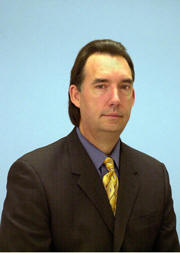 |
David Thomas, Chief, Computer Intrusion Section, Cyber
Division, FBI, Washington DC
After
completing more than a dozen years of in-charge roles
with the FBI in areas such as violent crime, domestic
terrorism, national infrastructure protection, Agent
Thomas was appointed to the position of Chief of the
Cyber divisions Criminal Computer Investigation Unit (CCIU)
in June 2001. As Chief of CCIU, Mr. Thomas directed the
FBIís efforts on many large-scale cyber investigations
and is considered an authority on Eastern European
hacker groups. In April 2003, he was transferred to the
St. Louis Division as the Assistant Special Agent in
Charge. In July 2004, Mr. Thomas was promoted to the
position of Section Chief, Cyber Division, FBI HQ. In
this capacity, Mr. Thomas oversees all
Counterterrorism/Counterintelligence and Criminal
computer intrusion investigations. Additionally, he is
responsible for development of Cyber Intelligence and
Cyber Action Teams which deploy internationally in
response to major cyber events.
|
|
|
|
Robert McGraw,
Technical Director, IA Architecture and System Security
Engineering Group,
NSA
Challenges to National Cyber Security
This
talk will highlight some of the Information Assurance
(IA) challenges facing the nation as we move full speed
ahead into a net-centric, information-sharing
environment. An introduction to NSAís IA mission will be
provided, followed by a discussion of some of the trends
that are impacting IA.
Mr. McGraw
is the Technical Director for the Information Assurance
Architecture and Systems Security Engineering Group at
the National Security Agency (NSA). His group is
responsible for defining the information assurance
capabilities for the Department of Defenseís (DoD)
Global Information Grid, which will transform DoDís
approach for communications and information management.
They are also responsible for providing Information
Systems Security Engineering services to a vast array of
DoD and other government programs.
Mr. McGraw received a Bachelor of Electrical Engineering
degree from the University of Detroit and a Masterís
Degree in System Engineering and Technical Management
from the Johns Hopkins University. He has been with the
NSA since 1973 where he has spent his career
architecting and developing Information Security
products and systems for space, combat, and
cryptographic key management applications.
|
|
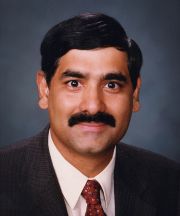 |
Prof.
Sujeet Shenoi, University of Tulsa
Digital
Forensics: Challenges and Opportunities
Sujeet
Shenoi is the F.P. Walter Professor of Computer Science
at the University of Tulsa. An active researcher with
specialties in cyber security, digital forensics and
critical infrastructure protection, Dr. Shenoi is
currently the principal investigator on projects
supported by the National Science Foundation (NSF), FBI,
Secret Service, IRS, U.S. Departments of Defense and
Homeland Security, and the National Security Agency. Dr.
Shenoi is the Director of the Cyber Security Education
Consortium, an NSF-supported initiative focused on
building a high-tech workforce in Oklahoma and six
neighboring states. He serves on the FBI's National
Steering Committee for the Regional Computer Forensics
Laboratory Program. He is also the founder of the Tulsa
Undergraduate Research Challenge (TURC), a nationally
recognized program of scholarship and service. For his
innovative strategies integrating academics, research
and service, Dr. Shenoi was named the 1998-1999 U.S.
Professor of the Year by the Carnegie Foundation.
|
|
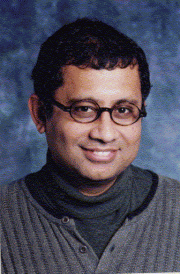 |
Prof. Badri Nath, Rutgers University
Topic: Securing Measurements in Sensor networks
Sensor
networks convey information that is obtained from actual
measurements of the physical world. Ensuring the
accuracy of the measurement becomes paramount if actions
are taken based on the sensor readings. Techniques for
detecting and coping with tampering or manipulating
sensors or the environment are needed. Several
techniques for increasing the confidence of sensor
measurements will be presented. In particular,
multimodality will be used to improve the confidence of
sensor measurements. An information assurance
architecture along with challenges in designing robust
wireless sensor networks will be outlined.
Dr. Badri
Nath is a Professor in the Computer Science Department
at Rutgers University and a member of WINLAB. He is a
co-Principal investigator of the DataMan project at
Rutgers University. His research interests are in the
area of sensor computing and large scale non-traditional
(inventory, vehicular and home) networks. Current
projects explore research issues in manageability and
dependability of sensor networks, mobile and wireless
networks. His current interest is on developing a robust
information architecture for sensor networks to enable
actuations.
Prof Badri
Nath received a Ph.D. in Computer Science from the
University of Massachusetts, Amherst and a M.E. from the
Indian Institute of Science (School of Automation). He
is the recipient of the best paper award at HPSR(2003),
the ten year best paper award at VLDB (2002) and
professor of the year award for best teaching (1995).
|
|
|
|
Holly Hubert,
Supervisory Special Agent,
FBI
FBI Buffalo Cyber Task Force and InfraGard
Holly
Hubert is a cyber crime supervisory special agent in the
FBI's Buffalo office. Hubert, a 13-year veteran of the
Bureau, directs the local office's 16-member Buffalo
Cyber Task Force, a specially trained team that includes
eight FBI agents and representatives of other local,
state and federal law enforcement agencies.
|
|
|
|
Timothy P. Clancy,
Project Director, Committee on Science, United States
House of Representatives
In his
second stint on the House Science Committee staff, Tim
Clancy serves as the Project Director on the majority
staff of the House Committee on Scienceóresponsible for
coordinating science and technology (S&T) issues
relating to Committee Chairman Sherwood Boehlertís home
district and the State of New York, oversight over
state-federal S&T partnerships and international S&T
policy. He is also responsible for outreach to all
majority members of the Committee.
In the
107th and 108th Congresses, Tim served as coordinator
for Committee efforts in cybersecurity R&D, resulting in
the drafting of H.R. 3394 (P.L. 107-305), the
Cybersecurity Research and Development Act, signed by
President Bush on November 27, 2002. He also helped
draft provisions of 21st Century National Nanotechnology
Research and Development Act (P.L. 108-153), legislation
that originated in the Science Committee. In the 109th
Congress, he will continue to advise Chairman Boehlert
on nanotechnology, information technology and Homeland
Security technology issues generally as the Committee
continues oversight over both the implementation the
Cybersecurity R&D Act and the Nanotechnology R&D Act,
other IT research and development programs and the S&T
programs of the Department of Homeland Security.
Mr. Clancy
previously served as a Professional Staff Member on the
minority staff of the then-Science Subcommittee of the
House Science, Space and Technology Committee from
1993-1994 with oversight responsibility over the
National Science Foundation and the Department of
Energy. Between his tours on the Science Committee,
Mr. Clancy served from 1994-2001 as Senior Legislative
Policy Analyst in the Office of Legislative & Public
Affairs at the National Science Foundation. In this
position Mr. Clancy served as liaison to the U.S. House
of Representatives and the United States Senate for the
NSF Director and the Deputy Director, focusing on
research and education policy across all disciplines of
science and engineering.
Tim
earned a B.A. in Political Science from the College of
the Holy Cross in Worcester, MA and a J.D. from Western
New England School of Law in Springfield, MA where he
was a member of the Law Review. Originally from Rome,
New York, he currently resides in Alexandria, Virginia.
|
|
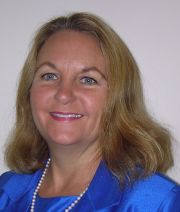 |
Elysa Jones -
Engineering Program Manager, Warning Systems, Inc.
Ms. Elysa
Jones is the Engineering Program Manager for Warning
Systems, Inc. (WSI). She holds a BA degree in
Economics and a MS degree in Computer Science from the
University of Alabama in Huntsville. She has over 25
years experience in engineering program management,
software engineering and product design and development.
She has been with WSI since 1998 and has been
instrumental in the successful design and development
of new products and the installation of major radio
warning systems. She also served on the board of
trustees for the Partnership for Public Warning and is
committed to the work of improving public warning in
our country and throughout the world. She is the
current Chair of the OASIS Emergency Management
Technical Committee. She received the first annual
Leadership in Emergency Interoperability Award from
the Emergency Interoperability Consortium. Ms. Jones
works diligently to further standards development to
support all aspect of Emergency Management. Through
this work she monitors the development of the National
Incident Management System (NIMS), the National
Response Plan (NRP), and other emergency management
initiatives to insure that the direction of WSI
product development is in keeping with changes in the
field.
|
|
|
|
Chief Scott R.
Patronik, CISSP, CFCE, Erie County Sheriff's Office
Wireless Security
Scott R.
Patronik is the Chief of the Technology and Advancement
Division of the Erie County Sheriff's Office in Buffalo,
New York where his duties include overseeing Information
Security for the agency and the agency's Computer Crime
Unit. Scott has been investigating high technology
crimes since 1995 and previously served with the New
York State Police. He also has experience working in the
private sector as a Software Engineer for Computer Task
Group, Inc.
Designations held by Scott include being a Certified
Information Systems Security Professional (CISSP) as
conferred by the International Information Systems
Security Certification Consortium (ISC) and a Certified
Forensic Computer Examiner (CFCE) as conferred by the
International Association of Computer Investigative
Specialists (IACIS). He is also a member of the High
Technology Crime Investigation Association (HTCIA) and
the International Association of Chiefs of Police.
Affiliations include serving as a Board Member for the
Buffalo Chapter of Infragard and a Charter Member of the
Law Enforcement Coordinating Committee (LECC) on
Information Technology Crimes in the Western District of
New York.
Scott is also a member of the National Institute of
Justice Technical Working Group and a member of the FBI
- Scientific Working Group on Digital Evidence (SWGDE),
both groups are involved in producing suggested
guidelines for the Examination of Electronic Evidence.
|
|
 |
Prof. Patrick
C.K. Hung,
Univ. of Ontario
Institute of Technology
Web Services
Composition for E-Commerce: A Security Perspective
Patrick C.
K. Hung is an Assistant Professor at the Faculty of
Business and Information Technology in the University of
Ontario Institute of Technology since July 2004. He is
currently cooperating with Boeing Phantom Works
(Seattle, USA) and Bell Canada's Privacy Center of
Excellence (Toronto, Canada) on an industrial
security-and privacy-related research project
respectively. Before that, he was a Visiting Assistant
Professor at the Department of Computer Science in the
Hong Kong University of Science and Technology in Hong
Kong and a Research Scientist with Commonwealth
Scientific and Industrial Research Organization (CSIRO)
at Canberra in Australia. He also has prior industrial
experience in e-business projects in North America and
Hong Kong. From 2000 to present, Patrick has been
serving as a panelist of the Small Business Innovation
Research and Small Business Technology Transfer programs
of the National Science Foundation (NSF) in the USA. He
is an executive committee member of the IEEE Computer
Societyís Technical Steering Committee for Services
Computing (TSC-SC), an associate editor/editorial board
member in several international journals, and a program
organizer/committee member in international
conferences/workshops. He has been a book reviewer for
Prentice Hall and Springer, and also a reviewer for the
IEEE Transactions on Computers, the IEEE Transactions on
Systems, Man, and Cybernetics (SMC), the Programming
.NET Web Services, the IEEE Computer magazine, the IEEE
Internet Computing magazine, the Decision Support
Systems (DSS), the VLDB Journal, the Journal of
Electronic Commerce Research.
|
|
 |
Harry G. Meyer,
Hodgson Russ
Round-Table Session:
Security in Small & Medium Businesses
Mr. Meyer
has extensive experience with the New York State
Environmental Quality Review Act ("SEQRA"). Among
significant projects, he (i) represented the Cattaraugus
County IDA as lead agency under SEQRA for the review,
comments to, modification, hearing and final acceptance
of the Environmental Impact Statement for a 1200-acre
recreational and sporting complex in the Town of
Yorkshire; (ii) handled environmental and real property
matters for the transfer of the water system from the
City of Buffalo to the Buffalo Water Board; (iii) worked
extensively with NYS DEC regulatory, legal and
permitting personnel; and (iv) represented Tops Markets
in connection with environmental matters for several
facilities including a major distribution center in
Lancaster, New York and several other facilities in New
York State.
Session
Participants
|
|
 |
Donna Kaputa, ECC
Dr. Donna
Kaputa teaches Computer Information Systems at Erie
Community College. She received her Ph.D. from SUNY
Buffalo. Dr. Kaputa is a recipient of a major NSF grant
for Information Systems Security curriculum development
for ECC in collaboration with SUNY Buffalo. The new
curriculum being prepared by Dr. Kaputa and her
colleagues incorporates the Cyber-Security skill
standards of the National Workforce Center for Emerging
Technologies (NWCET), as well as aspects of the CNSS
National Training Standards and the CompTIA Security+
framework. The curriculum targets both traditional
college students who wish to take courses in or
specialize in information systems security and industry
workers who wish to upgrade or retool their skills. Two
notable features of the curriculum are its emphasis on
real-world problems and issues and its use of isolated
computer network labs, which will enable students to
participate in hands-on experiments with security
penetration techniques and corresponding countermeasures
and protective approaches.
Round Table Session
Participants
|
|
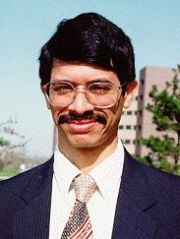 |
Prof. H. Raghav Rao, University
at Buffalo
E-Commerce Security Initiative at UB
Dr. Rao's
interests are in the areas of management information
systems, decision support systems, and expert systems
and information assurance. He has chaired sessions at
international conferences and presented numerous papers.
He has authored or co-authored more than 100 technical
papers, of which more than 60 are published in archival
journals. His work has received best paper and best
paper runner up awards at AMCIS and ICIS. Dr. Rao has
received funding for his research from the National
Science Foundation, the Department of Defense and the
Canadian Embassy and he has received the University's
prestigious Teaching Fellowship. He has also received
the Fulbright fellowship in 2004. He is a co-editor of a
special issue of The Annals of Operations Research, the
Communications of ACM, associate editor of Decision
Support Systems, Information Systems Research and IEEE
Transactions in Systems, Man and Cybernetics, and
coEditor- in -Chief of
Information Systems Frontiers.
|
|
|
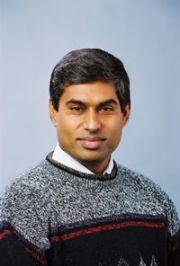 |
Prof. Shambhu Upadhyaya,
University at Buffalo
Wireless security Initiative at UB
Shambhu J. Upadhyaya is an Associate
Professor of Computer Science and
Engineering at the State University of New
York at Buffalo where he also directs the
Center of Excellence in Information Systems
Assurance Research and Education (CEISARE),
designated by the National Security Agency.
Prior to July 1998, he was a faculty member
at the Electrical and Computer Engineering
department. His research interests are
information assurance, computer security,
fault diagnosis, fault tolerant computing,
and VLSI Testing. He has authored or
coauthored more than 150 articles in
refereed journals and conferences in these
areas. His current projects involve
intrusion detection, insider threat
modeling, security in wireless networks, SoC
test scheduling, analog circuit diagnosis,
and RF testing. His research has been
supported by the National Science
Foundation, Rome Laboratory, the U.S. Air
Force Office of Scientific Research, DARPA,
and National Security Agency. In May 1999,
IBM sponsored a new Electronic Test and
Design Automation Lab to support his
teaching and research on VLSI Testing. He
has been awarded an IBM Faculty Partnership
Fellowship for year 2000-01 in recognition
of his research accomplishments in the area
of VLSI. He was also an NRC faculty fellow
in 2001 and 2002. In 2005, he received Cisco
equipment donation to build a computer
security lab. He has held visiting research
faculty positions at the Center for Reliable
and High Performance Computing, University
of Illinois, Urbana-Champaign, Intel
Corporation, Folsom, CA, Air Force Research
Laboratory, Rome, NY and the Naval Research
Laboratory, Washington DC. He was the
Program Co-Chair of the Fifth IEEE/ACM Great
Lakes Symposium on VLSI, 1995. He has served
on various Conference Committees including
the IEEE Simulation Conference, 1994, 1995,
1997, 1999 - 2004, Fault Tolerant Computing
Symposium, 1997, and 1999, IEEE
International Symposium on Defect and Fault
Tolerance in VLSI Systems, 1997, 1998, 2000
- 2003, and 1999, and IEEE Symposium on
Reliable Distributed Systems, 1998 and 1999.
He was the publicity chair of 1998 IEEE
International Computer Performance and
Dependability Symposium, and has served as
the Program Co-chair of IEEE Symposium on
Reliable Distributed Systems, 2000 held in
Nuernberg, Germany. He is an associate
editor of IEEE Transactions on Computers, a
member of the editorial board of the
International Journal on Reliability,
Quality, and Safety Engineering published by
the World Scientific Publishers. He was a
guest co-editor of the book series
Interfaces in OR/CS on Mobile Computing:
Implementing Pervasive Information and
Communication Technologies, Kluwer Academic
Publishers, 2001 and is a guest co-editor of
a special issue on Secure Knowledge
Management in IEEE Transactions on Systems,
Man and Cybernetics, March 2006. He was on
the Program Committee of 3rd IEEE
International Information Assurance
Workshop, Washington DC, March 2005, 6th
Annual IEEE Information Assurance Workshop,
West Point, NY, June 2005, and Dependable
Computing and Communications Symposium of
IEEE DSN-2005, among others. He is a senior
member of IEEE.
|
|
|

